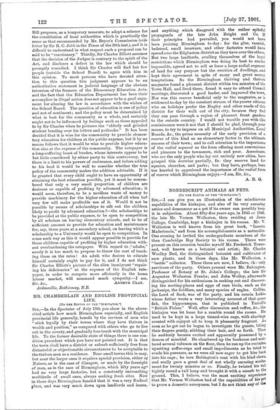MR. CHAMBERLAIN AND ENGLISH PROVINCIAL LIFE.
[TO THE EDITOR OP THE "SPECTATOR.")
SIR,—In the Spectator of July 13th you show in the above- cited article how much Birmingham especially, and English provincial life generally, benefit by the services of men who " stick loyally by their towns where they have thriven in wealth and position," as compared with others who go to live out in the county, and gradually lose touch with the municipal life. To the former desirable state of things there is one con- dition precedent which you have not pointed out. It is that the town shall have a district or suburb sufficiently free from distasteful or objectionable circumstances to be acceptable to the thriven men as a residence. Near small towns this is easy, but near the larger ones it requires special provision, either of Nature, as in the case of Glasgow, or made by the foresight of man, as in the case of Birmingham, which fifty years ago had no very large factories, but a constantly encroaching multitude of small ones, always seeking fresh sites. Now in those days Birmingham fancied that it was a very Radical place, and was very much down upon landlords and leases, and anything which disagreed with the rather spiteful propaganda of the late John Bright and Co. If their principles had prevailed, you would not have been praising Birmingham to-day : for the glue, varnish, bedstead, small ironware, and other factories would have spread over the Edgbaston district as they have over the others, But two large landlords, availing themselves of the legal restrictions which Birmingham was doing its best to render impossible, agreed not to sell or lease a large radial segment of land for any purpose but the erection of dwellings, and kept their agreement in spite of many and great money temptations. So the Birmingham thriving and thriven magnates found a pleasant district within ten minutes of the Town Hall, and lived there, found it easy to attend Council meetings, discovered a good leader, and improved the town, Nor was this reserve beneficial only to the magnates, as is evidenced to-day by the constant stream of the poorer citizens who on holidays prefer the Hagley and other roads of this district for their walk out of the city, because they find they can pass through a region of pleasant front gardens to the outside country. I would not trouble you with this reminiscence were it not that I should be glad, through your means, to try to impress on all Municipal Authorities, Local Boards, &c., the prime necessity of the early provision of a reserve of this kind as an elementary factor in the ultimate success of their town ; and to call attention to the importance of the radial segment as the form offering most convenience and pleasure to the townsmen, rich and poor. Americans, who are the only people who lay out entirely new cities, have grasped this doctrine partially, fox they reserve land for squares, churches, and parks; but they have, perhaps, been too hurried to apprehend the importance of the radial form of reserve which Birmingham enjoys.—I am, Sir, &c.,
A. B. G.


































 Previous page
Previous page